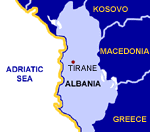
Algeria
Central Africa
Sierra Leone
Zimbabwe
Asia
Burma/Myanmar
Cambodia
Central Asia
Indonesia
Balkans
Albania
Bosnia
Kosovo
Macedonia
Montenegro
Serbia
Issues
EU
HIV/AIDS
Terrorism
Latin America
Colombia
 
|
||||||
Project Overview
ICG established a field presence in Albania in June 1998, tasked with identifying ways in which the international community can best support efforts to tackle the country's most pressing problems: its crumbling state structures, the lack of security, rampant corruption, and large-scale weapons and drug trafficking. A further focus for ICG's work is Albania's evolving role in the Balkan region, especially in regard to the manifestations of Albanian nationalism and pan-Albanian aspirations.
|

| Albania's Parliamentary Elections 2001 Briefing 23 August 2001 |
|
| Albania: The State of the Nation 2001 Report 25 May 2001 |
|
| Albania's Local Elections: A Test of Stability and Democracy Briefing 25 August 2000 |
|
| Albania: State of the Nation Report 1 March 2000 |
|
| The State Of Albania Report 6 January 1999 |
|
